By Edward W. Said and Nashwa Bawab
In These Times 18 September 2023
Region: Middle East & North Africa
Theme: History, Law and Justice
In-depth Report: PALESTINE
All Global Research articles can be read in 51 languages by activating the Translate Website button below the author’s name.
To receive Global Research’s Daily Newsletter (selected articles), click here.
Click the share button above to email/forward this article to your friends and colleagues. Follow us on Instagram and Twitter and subscribe to our Telegram Channel. Feel free to repost and share widely Global Research articles.
***
In September of 1982, Edward Said analyzed the Zionist invasion of Lebanon, calling for justice for Palestinians. Days later, the right wing Lebanese Phalangist militia, accompanied by Israel, embarked on a brutal massacre at the Shatila refugee camp.
Forty-one years ago, in the midst of the Lebanese Civil War, Israeli Defense Forces invaded southern Lebanon and besieged Beirut, forcing the Palestine Liberation Organization into Tunisia. With much foresight, Edward Said wrote a piece in September 1982, stating:
“What matters about Palestine is what has always prevented Israel from converting its military superiority into lasting political gains: that invincible Palestinian desire to keep hold of what is right and to reject what is wrong.”
Image: “Robin Moyer, USA, Black Star for Time. Beirut, Lebanon, 18 September 1982. Aftermath of massacre of Palestinians directed by Lebanese Forces with the complicity of senior members of the Israeli Cabinet and Defence Forces and conducted by Christian Phalangists and members of the South Lebanon Army in the Sabra and Shatila refugee camps.” “Moyer saw flares burst above the camps, and went there to discover piles of bodies – brutally shot. He photographed for hours surrounded by the smell of death, while soldiers joked around. The killers were never brought to justice.” (Licensed under Fair Use)
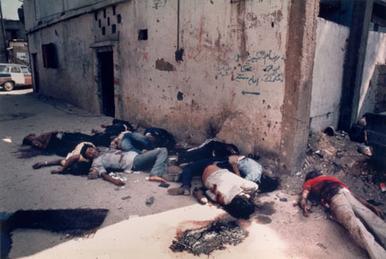
Just a few days after this piece by Said was published by In These Times, the right wing Lebanese Phalangist militia, accompanied by Israel, entered the Shatila refugee camp and the adjacent Sabra neighborhood, closed off exits and went on a two day killing campaign. The Sabra and Shatila Massacre occurred between September 16 and 18 and ended with between 2,000 and 3,500 Palestinian and Lebanese men, women and children dead. This became known as one of the most horrific massacres of the Lebanese Civil War.
Today, as Israel continues its occupation of Palestine in new and brutal ways, it also continues fighting skirmishes along the southern border of Lebanon.
In 1982, Edward Said wrote:
With thousands of Israeli troops ravaging Lebanon, with literally uncountable civilian casualties caused by terror bombing, with a political campaign designed expressly to dehumanize the Palestinians (two-legged beasts, terrorists, as Begin and his minions call them) in order to kill them more easily— with all this and worse, it may now seem inappropriate to reflect on the idea of Palestine. Certainly the Philip Habib mission allowed for no such reflection, and this, like American policy itself, takes the sense out of the Middle East.
Unlike Europe, where at least there is a historical sense of the human and political meaning of the struggle for Palestine by Palestinians, the American scene is rife either with on-the-spot reductive reporting of the kind that encourages Israeli apologists to say the media lied about the war’s horrendous scope, or with endlessly dreary commentary about questions, formulated by U.S. policymakers, that skirt the issues and confine the Palestinian problem to evacuation from Beirut.
Yet in both Europe and America, the immediate drama of the Palestinian-Lebanese tragedy threatens entirely to overwhelm thought. And even though expressions of outrage, displays of attitude and pratings about “new political opportunities” are understandable, one must not lose sight of the ideas and values embodied in the awful scenes unfolding before us. There are three important aspects of the idea of Palestine.
First, the idea of Palestine — represented by every one of the four million Palestinians — has driven the Israeli military machine to its furious assaults on Lebanon and elsewhere. There is a simple, irreducible authenticity in the simple existence of Palestinians who speak of Palestine as their homeland, an authenticity with which Zionists have been unable to deal except by massive negation and denial. Security, peace or an end to terrorism are not the root issue, but rather the assertion by every Palestinian, militant or not, that he or she was displaced, dispossessed, dispersed by Israel when it appeared in 1948. Leaving aside Begin, Sharon and Eytan, whose outrages upon logic and life have provoked respected Israelis like Professor Yehoshua Leibowitz to speak of “Judeo-Nazism,” Israeli resourcefulness has always faltered. when it came to native Palestinians. Either they were ignored, or they were to be punished. For once you create a polity based, so far as Palestinians are concerned, on the advantages of being a Jew and the equal and opposite disadvantages of being a non-Jew, the collective enterprise will inevitably be called into question by the non-Jews (the Palestinians) who must live the disadvantages. The more they have done so, the more Zionists have collectively denied them. This pattern has, obviously enough, increased the level of Palestinian resistance.
The idea of Palestine—represented by every one of the four million Palestinians—has driven the Israeli military machine to its furious assaults on Lebanon and elsewhere.
Zionist Project Has Always Been Colonisation and Exclusion of Indigenous Palestinians
Israeli’s present policies are all designed to destroy the Palestinian will to national self-determination by destroying the basis for an independent Palestine. The word Palestine is forbidden on the Occupied Territories, as are any institutions expressing Palestinian nationalism — schools, universities, books, newspapers, municipal councils. Above all, it is the idea of Palestine as it has been formulated, bumblingly and perhaps confusedly by Palestinians as an idea of coeval existence in the same world now ruled by Zionists, that Israel seems to have committed its national energies to fighting. No opening articulated by the PLO, or for that matter by Zionist doves, seems unworthy of rejection, attack, abuse.
How starkly it has come down to the truth that hardline Zionists, with their purblind Western apologists in tow, stake Israel’s existence on the actual liquidation of any trace of Palestinian life. How utterly despicable is Begin’s demagoguery when it posited either Palestine or Treblinka while his armies were bombing refugee civilians without mercy a few miles away, and incarcerating many thousands of their men in virtual concentration camps, denied prisoner of war status.
Yet Israeli supporters like Conor Cruise O’Brien still rant on about the virtues of “peace in Galilee,” ignoring the truth. For the past year alone there have been more than 7,000 Israeli violations of Lebanese air-space, territorial waters, land boundaries, each recorded by United Nations Truce Observers. Compared to one Israeli casualty during the three months prior to the invasion, Israel killed several hundred Palestinians and Lebanese in air strikes and border raids, and maintained a cashiered Lebanese officer in an enclave inside Lebanon. This is the state that now says it is for a free and independent Lebanon, without at the same time concealing that it wants Lebanon ruled by its Phalangist allies. Far from the attempted assassination of Shlomo Argov being a real reason for the invasion, Israeli officials — Begin, Shamir, Sharon, Arens, Eytan — have repeatedly stated their intention to raid Lebanon. It has always been a question of “when” not of “whether.” As for the gravity of the supposed PLO ability to destroy Israel, so gullibly and piously reported by the tearful O’Brien, that was never taken seriously by ruling Israelis. The war’s military results have disproved it completely, although now Begin’s propaganda mills are grinding out a new confection, that Israel forestalled a Soviet takeover of the Middle East. The main point has always been Israel’s unremitting war on the very concept of Palestinian nationalism, so that the aggression on Lebanon was a required extension of colonial practices on the West Bank and Gaza. Menahem Milson has been saying exactly that for well over a year.
The last remnant of Arabism.
Second, the idea of Palestine today is the last credible and actual component of Arabism. Divided as it has rarely been before, the Arab world presents a spectacle provoking laughter and tears in equal measure. Vast wealth and potential power for good are squandered. Internecine quarrels take an unseemly toll in lives as well as resources. The greedy corruption of alienated, incompetent regimes have turned most of the Arab world into something closely resembling a prison. Along with the abrogation of democracy, the regimes justify their authoritarianism in the name of national security and of Arabism. Religious fundamentalism has been bred in direct response both to the regimes’ tacit complicity with the enemies they profess to be fighting and to the Arab world’s directionless drift. When creativity or talent appears it is routinely, and officially, silenced. Only cults of the ruler, the party, and the regime are given unlimited headway. And still the rhetoric of Arabism pours forth.
At its focal point is Palestine. Yet, as recent research has shown, it has always been popular pressure on indifferent rulers that brought them round to the Palestinian cause. This was the case in the Gulf during the 1936 Palestine General Strike when the first financial aid to the Palestinian Arabs was sent, and the pattern has continued since. Plainly, however, rulers have gotten the better of their people, since during the darkest days of the Israeli siege of Beirut all that the Arab states could muster was some pleading at the American court, and ineffective pleading at that. The question is why, and why is the question of Palestine relevant to all this?
Palestinian stand in Lebanon and elsewhere incarnates opposition (indeed, the only consistent opposition) to Israeli designs on the Arab world.
For one, the presence of a body of committed, politicized Palestinian fighters organically related to their community directly impugns every inactive Arab army and party. Yasser Arafat is on the front lines with his people, not in a palace; he walks the streets as unprotected as anyone else. His enemy is the common enemy and he fights it directly, instead of resorting to public rantings expressing enmity, even as private accommodations are made with the status quo. Can it be lost on any Arab that while 500,000 Arab troops, 900 Arab planes, 3,000 Arab tanks and three Arab countries could not withstand Israeli might for more than six days in 1967, the PLO has done so for eight weeks with scarcely 100 antiquated tanks and no air force at all?
For another, the Palestinian stand in Lebanon and elsewhere incarnates opposition (indeed, the only consistent opposition) to Israeli designs on the Arab world. Consider that for at least 50 years the Zionist vision of the region has narrowed inexorably to a ghetto state on the one hand and, on the other, an Arab world kept in a state of permanent unrest. According to a former chief of Israeli intelligence, the campaign in Lebanon wouldn’t have been possible without the safeguard of a neutralized Egypt. Israeli efforts to destabilize Lebanon have been in place since the middle ’50s, even down to the details of a Maronite major in South Lebanon acting as an Israeli surrogate: the Sharret diaries are irrefutable evidence of this. Gen. Sharon has been open about his plans. Last December he declared that Israeli “strategic” interests now included the whole of the adjacent Arab world, plus Iran, Turkey, Pakistan, North Africa and Zimbabwe. Jordan he has unilaterally decided is to be Palestinian, and in addition his government has bombed Iraq, annexed the Golan Heights, penetrated Saudi land, sea and air space, to say nothing of destroying Lebanon in order to make it “Christian.“
Against all this, the Arab states have nothing to say, and have done less. The Palestinians are the only force actually resisting Israel in the Middle East. In this they immediately enact the ritual incantation of Arab nationalism — that imperialism must be opposed. Only the Palestinians do it because the abiding idea of Palestine, which fuels their stubbornness, has given them the courage to do so.
Third, because the idea of Palestine is grounded in the life of every Palestinian, and because it represents the only direct Arab effort against an expansionist Israel, it is also a kind of wedge opening up the discrepancy between Israel as it has appeared internationally and as it is in fact. Moral, democratic, unusual, special: These were the words baptizing Israel’s creation in 1948. Its claims on the West because of European guilt over anti-Semitism continue, although almost everywhere else Israel is synonymous with ruthlessness, cruelty and oppression. The fact that no less than 24 beleaguered West Bank and Gaza mayors signed a declaration denouncing Israel’s war on Lebanon and expressing unqualified support for the PLO is, despite Milson’s theories, something to be noted for its own sake in the annals of settler-colonialism.
Who are the Palestinians if not the functional equivalent of Israel’s blacks, or red Indians? Why, if not because of its attitude toward the Palestinians, does Israel herd together naturally with South Africa, every fourth-rate Latin American junta, the entire American right wing, from Jerry Falwell to Irving Kristol to Ronald Reagan?
As for liberals who preach support for Solidarity and tutelage for Palestinians, or those who go on sanctimoniously about terrorism and are silent when it comes to Israel’s almost apocalyptic state terrorism, they are shown up for the moral cowards and liars they are because Palestinians can be seen dying on the TV screen every night.
The idea of Palestine living in all Palestinians is not just a matter of land, water and a flag. They are important, but not the only thing. What matters about Palestine is what has always prevented Israel from converting its military superiority into lasting political gains: that invincible Palestinian desire to keep hold of what is right and to reject what is wrong. By most standards, the Palestinians are a modestly endowed people, although a people possessed by what is in the strict sense a secular ideal. They want justice, but not abstract justice. Rather, they want something that can be lived by them collectively in forms that can still be called just. In support of this, they have offered no metaphysical rationale, no divinely ordained trans-historical scheme. For them the idea of Palestine is adequate to their real memory, their actual present and their minimal requirements for the future. This is the idea’s power, which even the Lebanese conflagration will not diminish.
*
Note to readers: Please click the share button above. Follow us on Instagram and Twitter and subscribe to our Telegram Channel. Feel free to repost and share widely Global Research articles.
Edward W. Said was Parr Professor of English and Comparative Literature at Columbia University
Nashwa Bawab is Assistant Editor at In These Times. She is an organizer and reporter with bylines in The Intercept, Electronic Intifada, Texas Monthly, The Texas Observer and more.
Featured image: Memorial in Sabra, South Beirut (Licensed under CC BY 3.0)
The original source of this article is In These Times
Copyright © Edward W. Said and Nashwa Bawab, In These Times, 2023
Comment on Global Research Articles on our Facebook page
Become a Member of Global Research
Filed under: American crimes, Israeli Crimes crimes against humanity, Lebanon, Palestine, Palestinian people | Tagged: 1975 Civil War in Lebanon, 1982 Invasion of Lebanon, Ariel Sharon, Edward Said, Menachem Begin, Palestinian Liberation Movement PLO, Pan-Arabism, Phalange party crimes, Ronald Reagan, Sabra and Chatila Massacre, The Six-Day War, Yitzhak Shamir | Comments Off on “The Idea of Palestine Hounds Zionists.” Edward Said




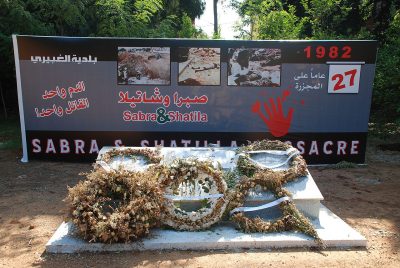













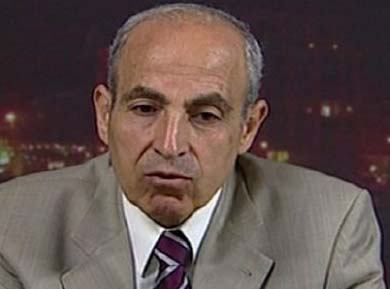

![السيرة الذاتيّة لأمين الجميّل: عندما يصبح الارتهان للخارج «مقاومة» [١]](https://al-akhbar.com/Images/ArticleImages/202118223044952637457418449523234.jpg)
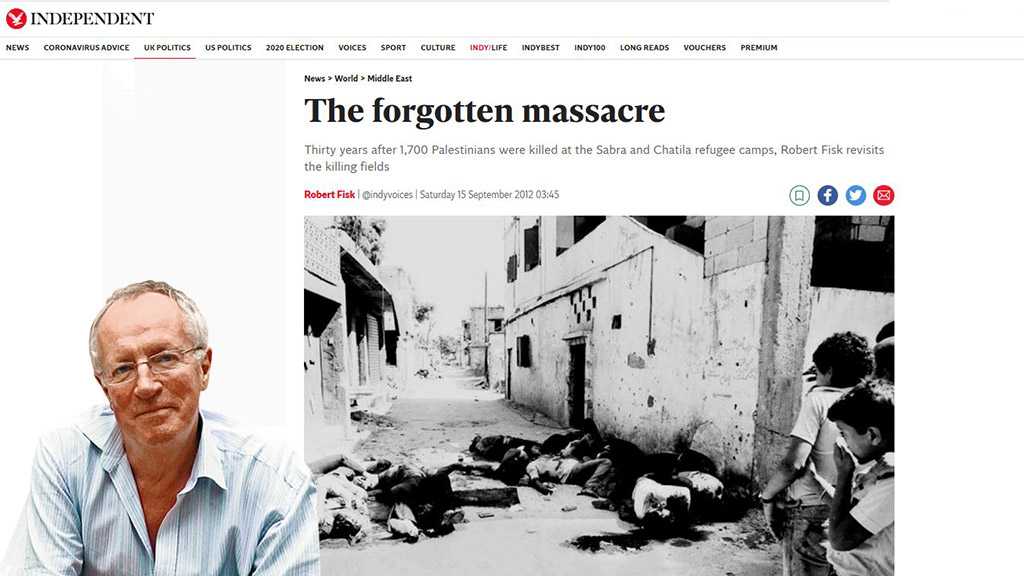
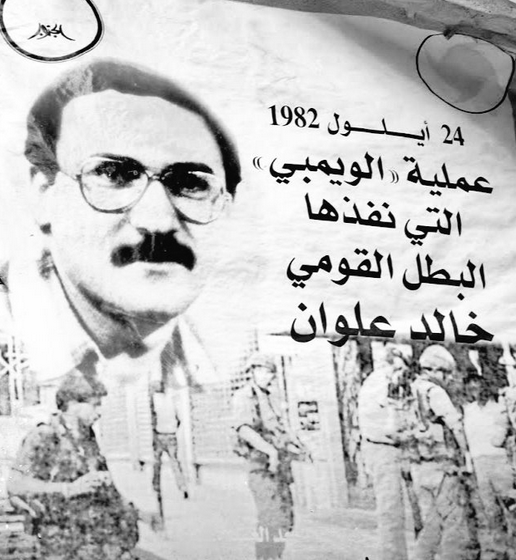


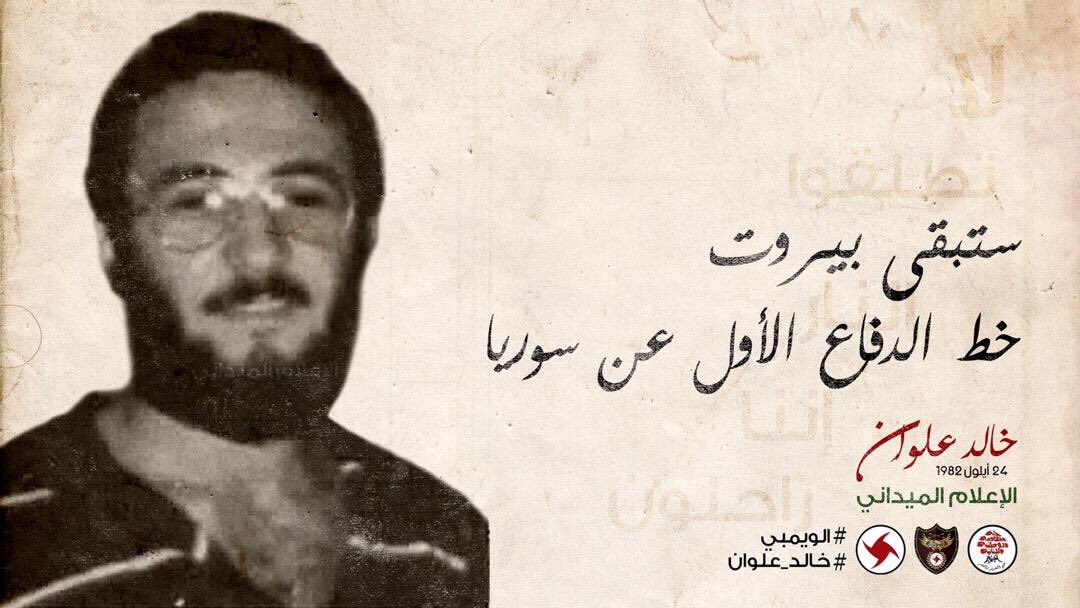

![قراءة في مذكّرات الرئيس أمين الجميل [2]: عن تجربة خالية من المراجعة والمحاسبة الذاتية](https://al-akhbar.com/Images/ArticleImages/20209112739579637345204595796471.jpg)
![قراءة في مذكّرات الرئيس أمين الجميل: حوار لا بدّ منه على طريق إعادة بناء الوطن [1]](https://al-akhbar.com/Images/ArticleImages/202082823120452637342524804520159.jpg)